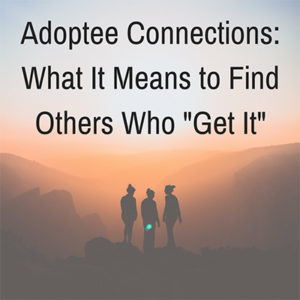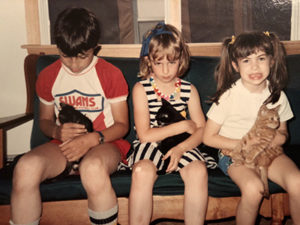Adoptee Connections — What It Means to Find Others Who Get It
 As a new clinical member of the BPAR community, I wanted to write a blog on my personal experience of connection and feeling “a part of” adoptee circles and the therapeutic benefits of adoptee connections. I feel so grateful every day to have other adoptees in both my personal life and my professional life. These connections have guided me to a place where I am able to feel more steadily rooted and connected to the world.
As a new clinical member of the BPAR community, I wanted to write a blog on my personal experience of connection and feeling “a part of” adoptee circles and the therapeutic benefits of adoptee connections. I feel so grateful every day to have other adoptees in both my personal life and my professional life. These connections have guided me to a place where I am able to feel more steadily rooted and connected to the world.
When I was of toddler age and up through elementary school, I remember often being around other adoptees. My parents were very involved with a group called the Open Door Society, an adoptive parent support and informational group for families touched by adoption or foster care. My house was the contact point for the New Hampshire chapter for many years. “The Group,” as our family very affectionately called it, got together often with their children. We would go apple picking, camping in the White Mountains and would celebrate the holidays together. My older adopted brother and I were immersed within a mini-culture of adoptee children, many of whom were domestic adoptees like us, but there were also many international adoptees. Because of our parent’s involvement with this group, we were able to have the notion introduced to us that we belonged. Our friends didn’t look like their parents either. I think, on some level, we may have thought that being adopted was even typical. I have memories of wondering with other adoptees who our birth parents were and what our “stories” were before we came to our parents. We could confide in each other about the things non-adoptees couldn’t understand. I felt proud to be a part of it.
Things felt different as I ventured into middle school. Life got busy and we grew more distant from “The Group.” Growing up in a small southern NH town, we were the only family of multiple adoptees I knew of. I remember one time in 6th grade seeing a boy from “The Group” and I exclaimed happily, “Hey you’re from the Adoption Group!” He shushed me and asked me not to tell anyone. I remember feeling surprised that he wanted his being adopted kept secret. As the years went on, I started to understand his response a bit more.
During those years, I began to notice that so often when I was telling a simple story about my Mom or Dad, kids would ask me things like: “Are you talking about your REAL Mom (or Dad)?” By REAL they meant “Birth Mom and Dad”, not the Mom and Dad who raised me who I considered my real Mom and Dad. I loved my parents so much, and it hurt to think others may see them or my relationship with them as not as “REAL” as the one they had with their parents. These sorts of postulations continued in some form throughout the remainder of school and were sprinkled throughout my adult life as well.
Every adoptee has to venture through a world of varied misunderstandings and of assumptions about what adoption is like for them. It certainly can contribute to feeling like “an outsider.” I know that having those years connected so closely to other adoptees in “The Group” when I was younger gave me a foundation to stand on as I made my way through all those questions and assumptions later on. When I was in my thirties, I joined an “Adult Adoptee” Meet Up group in Boston. It was a powerful experience for me. I met other adoptees, some of whom, in their adult lives, had met their birth parents and who had learned more about their pre-adoption story. I felt a love for each person I met in this group instantly, and listening to their stories felt so meaningful to me. After spending more time with these adult adoptees, I realized that again I felt understood in a way I couldn’t feel with other people and I could understand them in the same way. Being available to each other and supporting newcomers gave the opportunity for new purpose to our lives. These days there is quite a bit of psychological research that shows that connection with others heals and brings purpose to people’s lives. As a therapist, I have heard many personal accounts of people’s lives changing for the better when they find a community of people they can be themselves with and in which they are accepted and understood. Knowing we are all in this complicated and at times painful life together invites a reality comprised of hope and serenity. Nothing is as grounding as hearing someone saying, “Me too, I have been there.”
A note from BPAR: If you or your child is interested in building adoptee connections, please visit our Post Adoption Support Groups page for BPAR group descriptions and the schedule.
